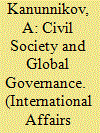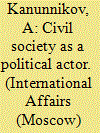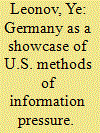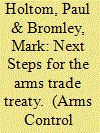|
|
|
Sort Order |
|
|
|
Items / Page
|
|
|
|
|
|
|
| Srl | Item |
| 1 |
ID:
159286


|
|
|
|
|
| Summary/Abstract |
THE WORLD faces a range of problems, among them new infectious diseases, growing poverty, environmental pollution, climate change, depletion of vital non-renewable energy resources, and dwindling reserves of drinking water. These problems affect everyone in the world and cause wide-scale concern, with civil society being one of the channels through which such concern is expressed.1 It is increasingly often argued that such problems cannot be solved without a system of global governance that would be based on values shared by people of all cultures, political views, religious beliefs, and philosophical principles. Not accidentally, this is one of the issues on the agenda of the United Nations - the organization has a specialized body for this purpose, the Commission on Global Governance.
|
|
|
|
|
|
|
|
|
|
|
|
|
|
|
|
| 2 |
ID:
181358


|
|
|
|
|
| Summary/Abstract |
THE PARTICIPATION of civil society in the politics of various countries is receiving increasing scholarly attention. Two clashing opinions regarding the place and role of civil society in today's world stand out in works written on this subject. Some researchers believe that civil society organizations should stay out of politics, while others insist that involving all civil society groups in the political process is vital to obtaining unique and accurate information necessary for political decision-making. Moreover, in European Union countries, for instance, persistent efforts have been made in recent years to improve governance mechanisms by drawing civil society into this integration organization at various levels [2].
|
|
|
|
|
|
|
|
|
|
|
|
|
|
|
|
| 3 |
ID:
160593


|
|
|
|
|
| Summary/Abstract |
HYBRID and information warfare, public diplomacy and soft power have a special role to play today. They form an extensive arsenal of means of pressure and influence that do not involve use of force but have proven to be much more effective than traditional military methods.
|
|
|
|
|
|
|
|
|
|
|
|
|
|
|
|
| 4 |
ID:
160055


|
|
|
|
|
| Summary/Abstract |
Since the end of Cold War, three sets of actors have produced change in global governance, change that could be threatening and transformative for existing global governance institutions and the future of international cooperation. Three alternative futures have emerged: fragmentation, stagnation, and transformation. Emerging powers—and some established powers—have promoted new regional institutions that offer useful competition but also the threat of fragmentation. Divergence of preferences between emerging and incumbent powers have also produced stagnation, but the greatest threat of stagnation has come with the rise of populist and nationalist movements that have now found a voice in two powerful countries, the U.S. and the U.K. Finally, non-state and subnational actors have produced new modes of governance, in which national governments and intergovernmental organizations play a reduced, though often strategic role. United States withdrawal from or disruption of global governance would alter the likelihood that these futures will emerge.
|
|
|
|
|
|
|
|
|
|
|
|
|
|
|
|
| 5 |
ID:
121703


|
|
|
|
|
| Publication |
2013.
|
| Summary/Abstract |
On April 2, the UN General Assembly adopted the text of the Arms Trade Treaty (ATT) by a vote of 156-3, with 22 abstentions.[1] After the treaty is opened for signature early this month, countries will sign it and prepare for its ratification according to their national procedures for considering treaties. The ATT requires ratification by 50 states before it can enter into force.
|
|
|
|
|
|
|
|
|
|
|
|
|
|
|
|
| 6 |
ID:
102540


|
|
|
|
|
| Publication |
2011.
|
| Summary/Abstract |
While a number of significant campaigns since the early 1990s have resulted in bans of particular weapons, at least as many equivalent systems have gone unscrutinized and uncondemned by transnational campaigners. How can this variation be explained? Focusing on the issue area of arms control advocacy, this article argues that an important influence on the advocacy agenda within transnational networks is the decision-making process not of norm entrepreneurs nor of states but of highly connected organizations within a given network. The argument is illustrated through a comparison between existing norms against landmines and blinding laser weapons, and the absence of serious current consideration of such norms against depleted uranium and autonomous weapons. Thus, the process of organizational issue selection within nongovernmental organizations (NGOs) and international organizations (IOs) most central to particular advocacy networks, rather than the existence of transnational networks around an issue per se, should be a closer focus of attention for scholars interested in norm creation in world politics.
|
|
|
|
|
|
|
|
|
|
|
|
|
|
|
|
|
|
|
|
|